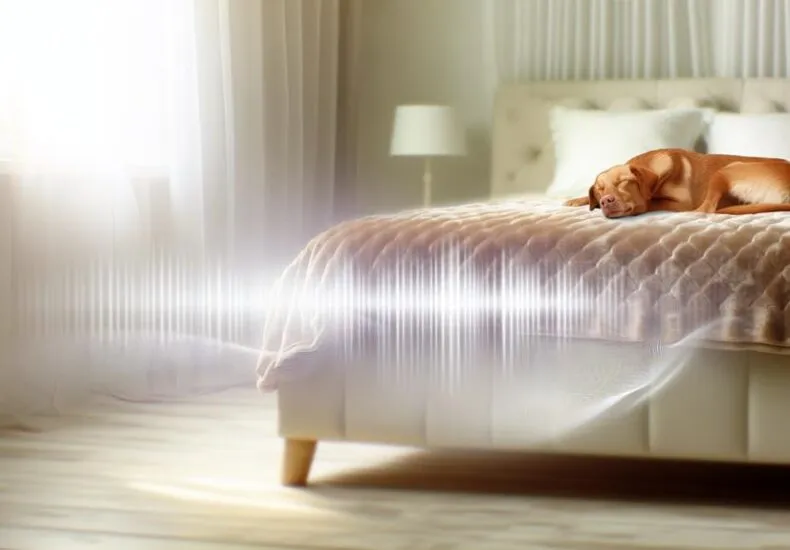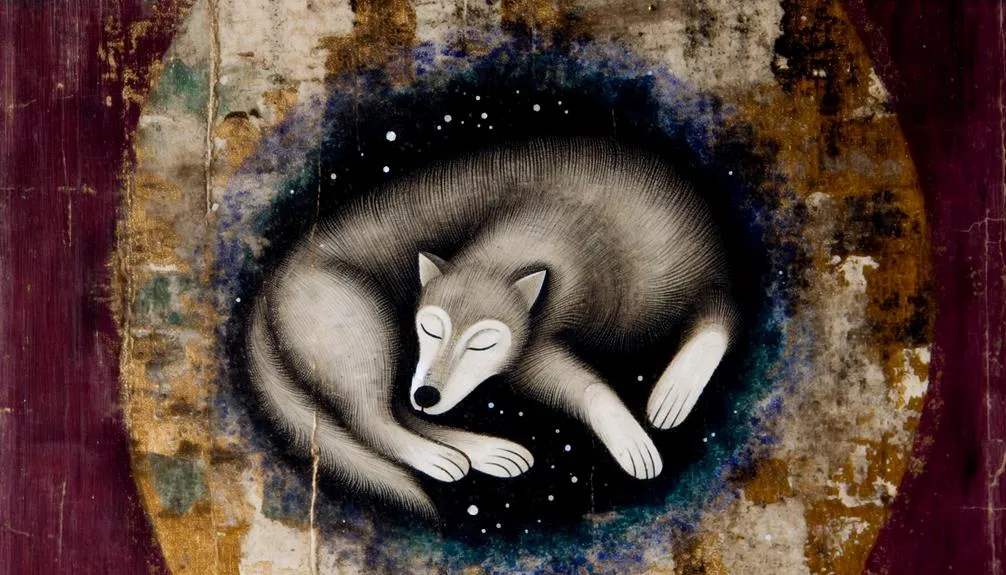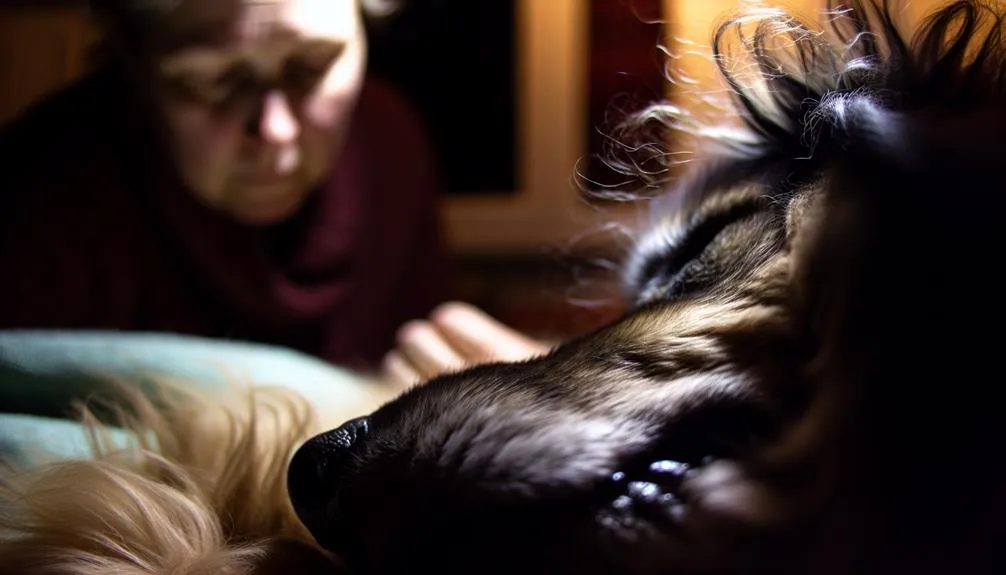
Why Is My Dog Breathing so Fast While Sleeping
Did you know that around 30% of a dog's sleep is spent in the REM stage, where they often breathe rapidly? While this fast breathing can be completely normal, it can also signal underlying issues that might concern you. You may find yourself wondering whether this is a typical part of their sleep cycle or a sign of something more serious. Understanding the reasons behind your dog's rapid breathing while sleeping can help you determine the best course of action for their well-being.
Normal Sleep Patterns in Dogs
Dogs, like humans, experience various stages of sleep, each serving different restorative functions. Their sleep patterns consist of multiple sleep cycles, which can be divided into two main phases: Non-Rapid Eye Movement (NREM) and Rapid Eye Movement (REM) sleep. Understanding these cycles is essential for interpreting dog behavior during sleep.
During NREM sleep, your dog enters a light sleep phase, where they may twitch or make small movements. This stage is necessary for physical recovery and energy restoration. As your dog shifts into deeper NREM sleep, their body repairs tissues and builds bone and muscle. This phase is critical for overall health and well-being.
The REM stage, however, is where the most vivid dreaming occurs. During this phase, you might notice your dog breathing more rapidly, twitching, or even vocalizing. These behaviors can indicate that they're processing experiences or emotions from their waking hours. Recognizing these patterns helps you understand that your dog is engaged in cognitive functions, similar to what humans experience during REM sleep.
It's important to note that the sleep cycles of dogs differ from those of humans. While humans typically cycle through deep sleep and REM sleep multiple times a night, dogs have shorter cycles that last about 20 minutes. By observing your dog's sleep behavior, you can gain insights into their health and emotional state. Understanding these normal sleep patterns can help you determine if any changes in their behavior warrant further attention.
Reasons for Fast Breathing
During sleep, it's not uncommon for dogs to exhibit rapid breathing, particularly in the REM phase. However, several factors can contribute to this fast breathing, and understanding them can help you determine whether it's a normal occurrence or something that needs attention. Here are three primary reasons for fast breathing in sleeping dogs:
- Exercise Impact: If your dog has had a particularly active day, their body may still be in recovery mode during sleep. High levels of physical exertion can lead to increased respiratory rates as their body works to oxygenate muscles and regulate temperature.
- Anxiety Triggers: Dogs can experience anxiety from various sources, including changes in their environment, loud noises, or separation from their owners. This anxiety can manifest even during sleep, resulting in rapid breathing as a response to stress.
- Health Conditions: Certain health issues, such as respiratory infections, heart problems, or pain, can lead to abnormal breathing patterns. If your dog's rapid breathing is accompanied by other symptoms, such as coughing, lethargy, or changes in appetite, it's important to consult a veterinarian.
Recognizing these factors can help you assess your dog's situation more clearly. While fast breathing during sleep might be typical, remaining observant and aware of any changes in your dog's behavior or health is significant. If you're ever in doubt, seeking guidance from a veterinary professional is always the best course of action.
REM Sleep and Dogs

In the domain of canine sleep, REM (Rapid Eye Movement) sleep plays an important role in your dog's overall well-being. During this stage, your dog experiences heightened brain activity, similar to what humans undergo. This is when dreams occur, and you might notice your dog twitching, moving their paws, or making noises. Understanding REM sleep can help you interpret your dog's behavior while they're snoozing.
Typically, REM sleep accounts for about 10-15% of your dog's sleep cycle, which is vital for mental and emotional health. It's during this phase that your dog processes experiences and emotions from their day, helping to reinforce learning and memory. If you observe your dog breathing fast while sleeping, it's often an indication they're in this active sleep stage. While it can be alarming, fast breathing in REM sleep is generally normal and not a cause for concern.
Additionally, the amount of REM sleep your dog gets can be influenced by their age and overall health. Puppies, for instance, require more REM sleep compared to adult dogs as they develop new skills and adapt to their environment. Similarly, older dogs may experience changes in their sleep patterns, including alterations in REM sleep duration.
Environmental Factors
Environmental factors can greatly influence your dog's breathing patterns during sleep. Room temperature, noise disturbances, and air quality issues might contribute to faster respiration rates. By evaluating these elements in your dog's environment, you can better understand the reasons behind their rapid breathing.
Room Temperature Effects
Room temperature can greatly influence your dog's breathing patterns, especially while they sleep. Dogs, like humans, rely on their environment for temperature regulation. If the room's too hot or too cold, it can lead to rapid breathing as their bodies work to adjust.
Pay attention to these three factors regarding room temperature:
- Temperature: Extreme temperatures can cause your dog to breathe faster. If it's too warm, the body struggles to cool down, leading to increased respiratory rates.
- Humidity Levels: High humidity can make it difficult for your dog to cool off, exacerbating breathing issues. A humid environment can cause discomfort, prompting your dog to pant or breathe rapidly even while resting.
- Drafts: Cold drafts can also affect your dog's comfort. If they're too chilly, their body may react by increasing their breathing rate to generate warmth.
Understanding these elements can help you create a comfortable sleeping environment for your dog. By ensuring ideal room temperature and humidity levels, you can minimize discomfort and improve your dog's overall well-being, potentially reducing instances of fast breathing during sleep.
Noise and Disturbances
Rapid breathing in dogs can also be influenced by external factors like noise and disturbances. If your dog is exposed to barking disturbances or other loud sounds while sleeping, it can lead to sleep interruptions that affect their breathing patterns. Dogs, much like humans, can be sensitive to their environment, and sudden noises might trigger a stress response, causing them to breathe more rapidly.
Consider the sources of noise in your home or neighborhood. Is there frequent barking from other dogs, traffic sounds, or even construction nearby? These disturbances can disrupt your dog's REM sleep, an essential phase for rest and recovery. When a dog enters a lighter sleep stage, it may exhibit faster breathing as a response to perceived threats or disruptions.
To help your dog achieve a more restful sleep, consider minimizing these disturbances. You might try using white noise machines, soft music, or soundproofing certain areas of your home. By creating a quieter sleeping environment, you can greatly reduce sleep interruptions and, as a result, help regulate your dog's breathing patterns during sleep.
Air Quality Issues
Several air quality issues can greatly impact your dog's breathing patterns, especially during sleep. It's important to be aware of the factors in your environment that could lead to rapid breathing. Here are three common air quality issues to evaluate:
- Airborne Allergens: Dust, pollen, and pet dander can trigger allergic reactions in dogs, causing discomfort and affecting their breathing. If your dog's sleeping area is contaminated, it may lead to faster breathing as they struggle to get enough oxygen.
- Humidity Levels: High humidity can create an uncomfortable environment for your dog. When the air is too moist, it can make breathing feel laborious, leading to increased respiratory rates during sleep. Conversely, low humidity can dry out their airways, causing irritation.
- Indoor Air Pollution: Smoke, chemical fumes, and other pollutants can greatly impact your dog's respiratory health. These irritants can cause inflammation in the airways, leading to faster breathing patterns.
Monitoring these air quality issues can help you create a healthier environment for your dog, potentially alleviating any concerns about their rapid breathing while sleeping.
Health Concerns to Consider

When you notice your dog breathing fast while sleeping, it's important to reflect on various health concerns that could be at play. Rapid breathing, or tachypnea, can indicate underlying issues that may require attention. One potential concern is a sleep disorder, which may disrupt normal breathing patterns. Conditions like sleep apnea or narcolepsy aren't just problems for humans; dogs can experience them too. If your dog's breathing seems irregular or excessively rapid during sleep, it could signal a problem worth investigating.
Another area to take into account is heart health. Conditions such as congestive heart failure can lead to increased respiratory rates, even at rest. If your dog is experiencing fatigue, coughing, or difficulty exercising alongside fast breathing, it's important to take note. Similarly, respiratory diseases, like bronchitis or pneumonia, might contribute to abnormal breathing patterns. These issues can be serious, and recognizing them early may improve outcomes.
Additionally, anxiety or stress may play a role in altered breathing. Dogs can experience nightmares or anxiety during sleep, which may manifest as rapid breathing. If you've noticed changes in your dog's behavior or routine, it's worth reflecting on the emotional aspects of their health.
Understanding these potential health concerns can help you stay vigilant about your dog's overall well-being. Keep an eye on any associated symptoms, as they might provide important clues about your pet's health status.
When to See a Veterinarian
If you notice signs of distress in your dog, such as excessive panting or restlessness while sleeping, it's important to take action. Additionally, keep an eye on any underlying health conditions that could be contributing to rapid breathing. If this behavior lasts longer than a few minutes, consulting a veterinarian is essential for your pet's well-being.
Signs of Distress
Recognizing signs of distress in your dog is essential for their health and well-being. Fast breathing while sleeping might not always indicate a problem, but it's important to remain observant. You should be aware of specific anxiety indicators and pain signals that could suggest your dog is in distress. Here are three signs to watch for:
- Changes in Behavior: If your dog suddenly becomes withdrawn, agitated, or displays unusual aggression, it might be experiencing anxiety or discomfort.
- Vocalizations: Excessive whining, barking, or growling during sleep can signal that your dog is in distress, potentially indicating pain or anxiety.
- Physical Symptoms: Observe for any signs like panting, trembling, or difficulty settling down, as these can point to underlying issues that need attention.
If you notice any of these signs, it's advisable to consult your veterinarian. Early intervention can make a significant difference, ensuring your dog receives the necessary care. Always trust your instincts—if something feels off, it's better to seek professional advice.
Health Conditions to Watch
Fast breathing during sleep can occasionally signal underlying health conditions that warrant attention. If you've noticed changes in your dog's breathing patterns, it's important to reflect on whether they may be indicative of a more serious issue. Conditions such as heart disease, respiratory disorders, or even anxiety can lead to rapid breathing while your dog is at rest.
Sleep disorders, including sleep apnea, could also be contributing factors. In these cases, the dog's airway becomes obstructed during sleep, leading to periods of gasping or fast breathing as they struggle for air. Additionally, if your dog has experienced recent weight gain, obesity can exacerbate these problems and place additional strain on their respiratory system.
It's vital to monitor other symptoms, like coughing, lethargy, or unusual behaviors, as these can help you determine the severity of the situation. If you notice persistent fast breathing or any concerning signs, it's best to consult your veterinarian. They can perform a thorough evaluation and recommend appropriate tests or treatments, ensuring your dog's health and well-being are prioritized.
Duration of Rapid Breathing
Monitoring the duration of your dog's rapid breathing during sleep is vital for evaluating their health. Rapid breathing can occur during different sleep cycles, particularly REM sleep, but it's important to differentiate between normal and concerning patterns. If your dog's rapid breathing lasts longer than typical, you should consider seeking veterinary advice.
Here are three key indicators to watch for:
- Breathing Duration: If your dog exhibits rapid breathing for extended periods (more than 20 minutes), it may signal an underlying issue.
- Accompanying Symptoms: Take note if you observe other symptoms like coughing, restlessness, or unusual vocalizations during their sleep cycles. These could indicate a more serious condition.
- Change in Patterns: If your dog's rapid breathing is a new behavior or markedly differs from their usual sleep patterns, it's worth discussing with your vet.
Tips for Monitoring Your Dog

When observing your dog during sleep, pay attention to their breathing patterns, as these can provide valuable insights into their overall health. Rapid breathing might be a normal part of their sleep cycle, especially during REM sleep when dreams occur. However, consistent fast breathing can indicate stress, anxiety, or even underlying health issues.
To monitor your dog effectively, start by creating a calm environment where you can observe them without disturbances. Take note of their typical breathing patterns when they're relaxed and compare these to their sleep patterns. If you notice significant changes, such as an increase in the rate or depth of their breath, take mental or physical notes.
Keep an eye on other dog behaviors as well. Is your dog restless, whining, or shifting positions frequently? These could be signs of discomfort or distress. Additionally, pay attention to their overall body language; a stressed dog may be more tense or rigid compared to their usual relaxed state.
If you find that fast breathing persists or is accompanied by other concerning symptoms—like coughing, lethargy, or a loss of appetite—consult your veterinarian. They can provide a thorough examination and determine if a more serious health issue is at play. Remember, monitoring your dog's breathing patterns and overall behavior is critical for early detection of potential health problems, ensuring your furry friend stays happy and healthy.
Frequently Asked Questions
Can Certain Dog Breeds Breathe Faster While Sleeping?
Certain dog breeds do have distinct breath patterns due to their breed characteristics. Brachycephalic dogs, for example, often breathe faster while sleeping, reflecting their unique anatomy and respiratory challenges compared to other breeds.
Is Fast Breathing During Sleep a Sign of Dreaming?
You might think fast breathing isn't significant, but it can indicate dreaming. During the sleep cycle, dogs exhibit dreaming indicators like rapid breathing, suggesting they're experiencing vivid dreams, similar to what humans experience.
How Long Does REM Sleep Last in Dogs?
In dogs, REM sleep typically lasts about 20 minutes within their sleep cycles. Understanding this aspect of canine physiology helps you recognize the significance of REM for your dog's overall health and behavior during rest.
Are Puppies More Likely to Breathe Fast While Sleeping?
Imagine a tiny engine revving in a peaceful night. Puppies often breathe faster during sleep due to their developing sleep patterns. Their rapid puppy breathing is normal, reflecting active REM sleep and growth phases.
Does My Dog's Diet Affect Their Sleep Breathing Patterns?
Yes, your dog's diet can considerably influence their sleep breathing patterns. A proper nutritional balance and dietary influences may affect relaxation and overall health, potentially leading to more stable breathing while resting.
Conclusion
In summary, while rapid breathing during sleep can often be a normal part of your dog's REM cycle, it's essential to remain vigilant. Some theories suggest that increased stress or underlying health issues could amplify this behavior. If you notice persistent fast breathing or any other concerning symptoms, don't hesitate to consult your veterinarian. Understanding your dog's unique sleep patterns is key to ensuring their overall well-being and addressing any potential health issues before they escalate.
You may also like
Archives
Calendar
| M | T | W | T | F | S | S |
|---|---|---|---|---|---|---|
| 1 | 2 | 3 | 4 | |||
| 5 | 6 | 7 | 8 | 9 | 10 | 11 |
| 12 | 13 | 14 | 15 | 16 | 17 | 18 |
| 19 | 20 | 21 | 22 | 23 | 24 | 25 |
| 26 | 27 | 28 | 29 | 30 | 31 | |
Leave a Reply